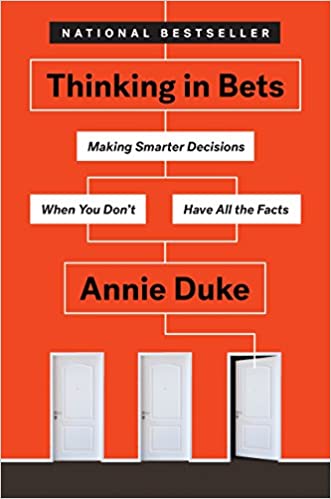
Notes on
Thinking in Bets: Making Smarter Decisions When You Don't Have All the Facts
by Annie Duke
• 4 min read
Bets as thinking devices
Bets are decisions about an uncertain future.
The quality of your decisions and your luck is what determines your outcomes.
The quality of our lives is the sum of decision quality plus luck.
Resulting
We have a tendency to equate the quality of the decision with the quality of the outcome.
In Poker, this is called resulting, and it’s something to be careful of. You can make a good decision yet still have a bad outcome due to luck, but that doesn’t change the quality of the decision.
This is also why you might not need to change strategy, even if yours isn’t working well for a few hands.
No sober person thinks getting home safely after driving drunk reflects a good decision or good driving ability.
Resulting sounds ridiculous when pointed out. This quote gives a good example. You wouldn’t think driving drunk is a good decision, even though you got home safe.
How do we overcome resulting?
Perhaps we could have a decision log, where we try to reason and compile what we know.
Then, later, you could go back and reflect. You’d obviously want to be careful of decision bias.
Seeking certainty and order—our mental shortcomings
Our brains thrive on certainty and order. And it really doesn’t like that luck plays a part. Nor does it like randomness.
In seeking certainty and order, we fall prey to certain shortcomings. These are biases and fallacies.
For example, assuming causation when there is only correlation, cherry-picking data to confirm our narrative (The Texas Sharpshooter Fallacy).
We’ll try hard to rule out luck and randomness as players.
While they can be (very) wrong and frustrating, we need our mental shortcuts. We can’t be deliberate and rationalize every decision we made. It’s simply not possible.
You’d be overthinking every step you take.
Most of what we do is automatic (and it needs to be that way). The challenge is to not change that part (because we can’t), but to learn how to do well in spite of it.
But we can’t just be aware of it and wanting to change it. It’s not enough.
Since we can’t remove our mental shortcuts, nor make every decision manual and deliberate, we need to learn how to deal with them.
We can use instruments / checklists and other tools to help us check that reality is as we see it.
We want our reptile brain / reflexive minds to execute on our deliberate mind’s best intentions.
How we form beliefs
This is how we form beliefs:
- We hear about it
- We believe it
- Maybe later, it’s possible that we might consider whether it’s true or not
This leads to us believing a lot of stuff that simply isn’t true.
For example, many people believe that one human year is equivalent to 7 dog years. That’s a common misconception.
How we can deal with forming bad beliefs
Reframing our beliefs as bets can help us examine and refine them.
We think about things more objectively in this way. Was it really pure luck? Or was it really pure skill? There are no other reasonable explanations?
Self-serving bias
Self-serving bias: if we do good, it’s to our credit (we’re skilled, talented, etc.) If we do bad, it’s plain ol’ bad luck.
We have a pattern for fielding outcomes.
Premortems
You pretend things have gone south. Why? What happened?
Start by imagining that you failed. Figure out why. Avoid it.
This is the negation of backcasting.
Premortems make it more likely we achieve our goals due to mental contrasting. This was found by Gabriele Oettingen (NYU Psychology professor and author of Rethinking Positive Thinking). Oettingen found that people who imagine obstacles in the way of achieving their goals are more likely to achieve them. This is what she calls mental constrasting.
Backcasting
A good model for thinking is to begin with backcasting.
Imagine you’ve reached the finish line. What now?
The 10-10-10 Framework for making better decisions
Duke stresses the importance of being able to draw different temporal versions of yourself into your decision making process.
Let’s take the 10-10-10 framework by analogy.
You’re deciding whether to buy a new car. Making this decision also requires more information, but humor me.
How would you feel today, if you made the decision
- 10 minutes ago? Great, probably. It’s super exciting to purchase new things.
- 10 months ago? The novelty is starting to, or has worn off. It’s just a car.
- 10 years ago? Now you’re really feeling the financial repercussions of purchasing the car. Was it actually worth it?
Liked these notes? Join the newsletter.
Get notified whenever I post new notes.